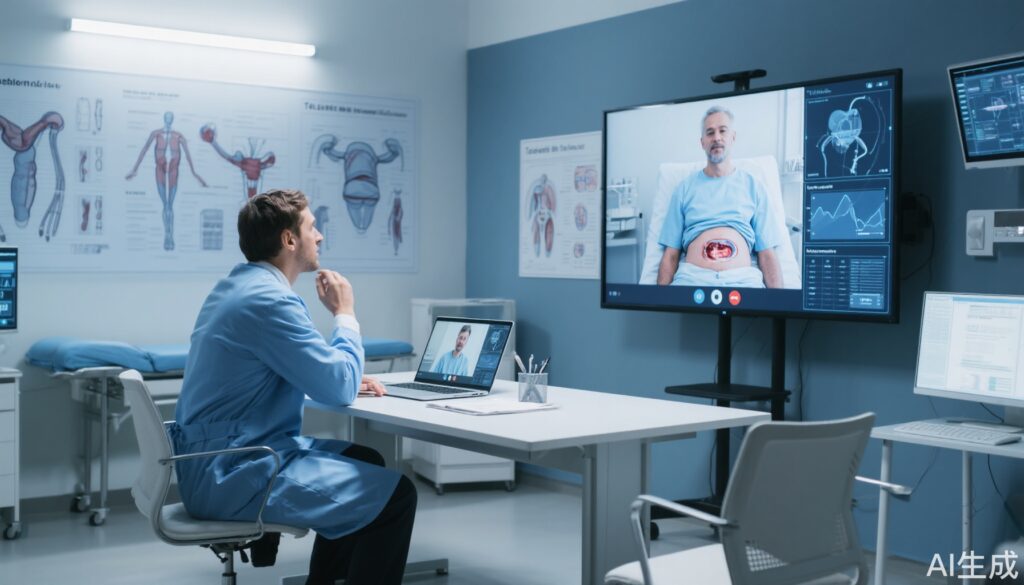Highlights
- Online video consultation is non-inferior to face-to-face consultation for preoperative assessment before major abdominal surgery in terms of patient satisfaction.
- Information recall by patients was virtually identical between online and in-person consultations.
- Technical issues were rare and did not significantly disrupt the consultation process.
- Findings support the routine use of online video consultations for surgical outpatient clinics.
Study Background and Disease Burden
The COVID-19 pandemic led to a rapid expansion in telemedicine, particularly online video consultations between patients and healthcare providers. While digital consultations offer logistical advantages—reducing travel, waiting times, and potential infectious exposures—concerns persist about their adequacy in high-stakes clinical scenarios. Preoperative consultations for major abdominal surgery are among the most demanding, requiring robust information exchange, shared decision-making, and patient reassurance. Patient satisfaction and the ability to accurately recall information are critical for informed consent and perioperative safety. Until now, there has been a lack of high-quality evidence comparing online video and traditional in-person consultations in this context.
Study Design
The VIDEOGO trial was a multicentre, open-label, randomised, controlled, non-inferiority study conducted at two Dutch hospitals (one academic, one regional) between February 2021 and October 2023. Adults (≥18 years) scheduled for major abdominal surgery and able to participate in both face-to-face and online video consultations were eligible. Patients unable or unwilling to sustain an online video interaction were excluded.
Participants were randomised (1:1) to receive either an online video or traditional face-to-face preoperative consultation. Allocation was stratified by study site using a concealed, computer-generated, permuted-block method. Due to the intervention’s nature, blinding was not feasible for patients or clinicians.
The coprimary outcomes were:
– Patient satisfaction, measured on a 0–100 scale, with non-inferiority set at a margin of -10%.
– Patient information recall, scored 0–11.
Both outcomes were assessed via online questionnaires in an intention-to-treat analysis. Technical adverse events (e.g., audio or video disruptions) were recorded immediately post-consultation.
Key Findings
A total of 120 patients were randomised: 60 to online video and 60 to face-to-face consultation. Outcome data were analyzed for 57 in the video group and 55 in the face-to-face group, with similar demographic distributions (median age ~63 years; 35–40% female).
Patient Satisfaction:
– Mean satisfaction score was 85.4 (SD 12.3) for online video and 85.2 (SD 14.2) for face-to-face.
– The mean difference (0.2, 95% CI -4.8 to 5.1) comfortably met the non-inferiority margin (p<0.0001 for non-inferiority).
Information Recall:
– Mean recall score was 7.30 (SD 1.60) in the video group and 7.25 (SD 1.48) in the face-to-face group.
– The difference (0.05, 95% CI -0.53 to 0.63) was negligible, suggesting equivalence.
Technical Safety:
– Technical adverse events were infrequent: among 29 video consults with available data, only two (7%) experienced temporary audio or video issues, both resolved during the encounter.
– No technical event resulted in failed or incomplete consultations.
These results provide robust evidence that online video consultations are not inferior to traditional face-to-face visits for complex surgical preoperative assessments, at least in terms of patient satisfaction and information recall.
Expert Commentary
The VIDEOGO trial addresses a critical knowledge gap in telemedicine. The study’s strengths include its multicentre design, rigorous randomization, use of validated patient-reported outcomes, and focus on a high-acuity clinical population. The non-inferiority margin (-10%) is methodologically sound and clinically reasonable for patient satisfaction.
However, some limitations should be acknowledged:
– The study excluded patients unable or unwilling to use video technology, potentially limiting generalizability to older or less technologically literate populations.
– The open-label design could introduce bias, though this is an inherent limitation in telemedicine trials.
– The trial did not assess long-term outcomes, perioperative complications, or cost-effectiveness, which are relevant for broader implementation.
Guidelines from surgical and anesthesiology societies increasingly support the integration of telemedicine for selected preoperative evaluations, particularly when physical examination is not essential or can be deferred. The VIDEOGO findings provide empirical support for these recommendations in major abdominal surgery.
Conclusion
The VIDEOGO trial demonstrates that online video consultations for preoperative assessment in major abdominal surgery are non-inferior to conventional face-to-face consultations regarding patient satisfaction and information retention. These results support the confident expansion of telemedicine in surgical outpatient care, with implications for healthcare access, efficiency, and patient-centeredness. Further research should evaluate broader patient populations, perioperative outcomes, and cost implications to optimize implementation strategies.
References
1. Ten Haaft BHEA, Janssen BV, Barsom EZ, Hehenkamp WJK, van Berge Henegouwen MI, Busch OR, van Dieren S, Erdmann JI, Eshuis WJ, Gisbertz SS, Luyer MDP, Damman OC, de Bruijne MC, Kazemier G, Schijven MP, Besselink MG; VIDEOGO Collaborators. Online video versus face-to-face preoperative consultation for major abdominal surgery (VIDEOGO): a multicentre, open-label, randomised, controlled, non-inferiority trial. Lancet Digit Health. 2025 Jun;7(6):100867. doi: 10.1016/j.landig.2025.02.007
2. Dorsey ER, Topol EJ. State of Telehealth. N Engl J Med. 2020;375:154-161.
3. American College of Surgeons. Telemedicine in Surgery: Guidance for Implementation. 2021.



